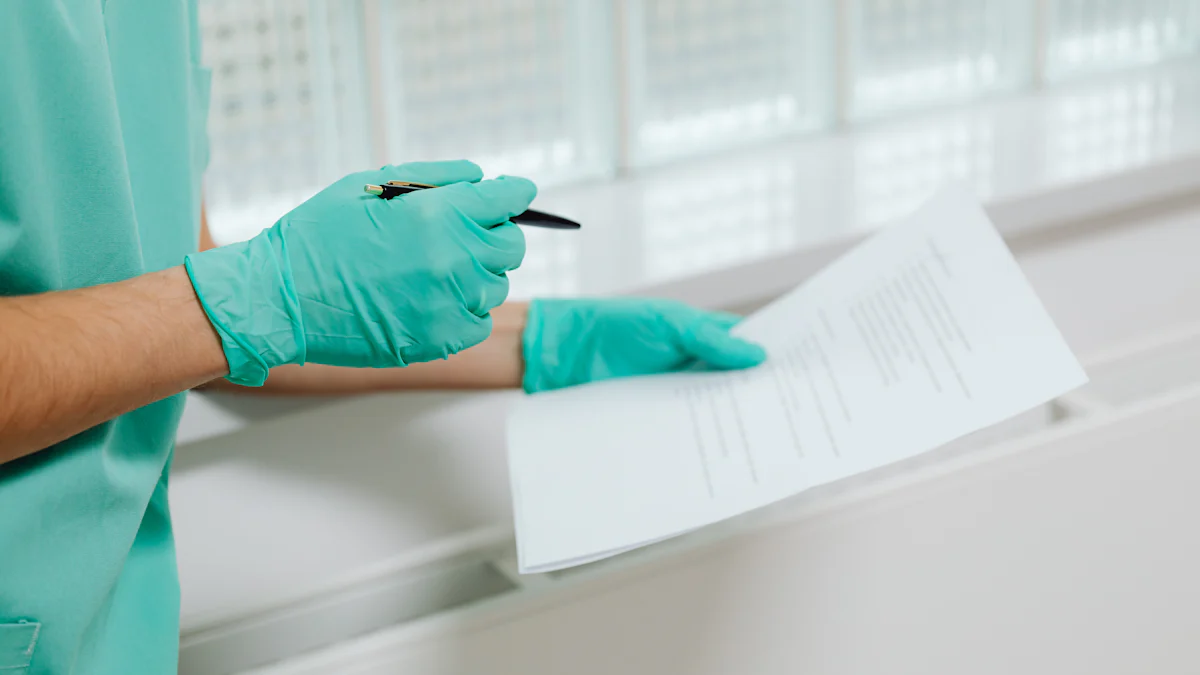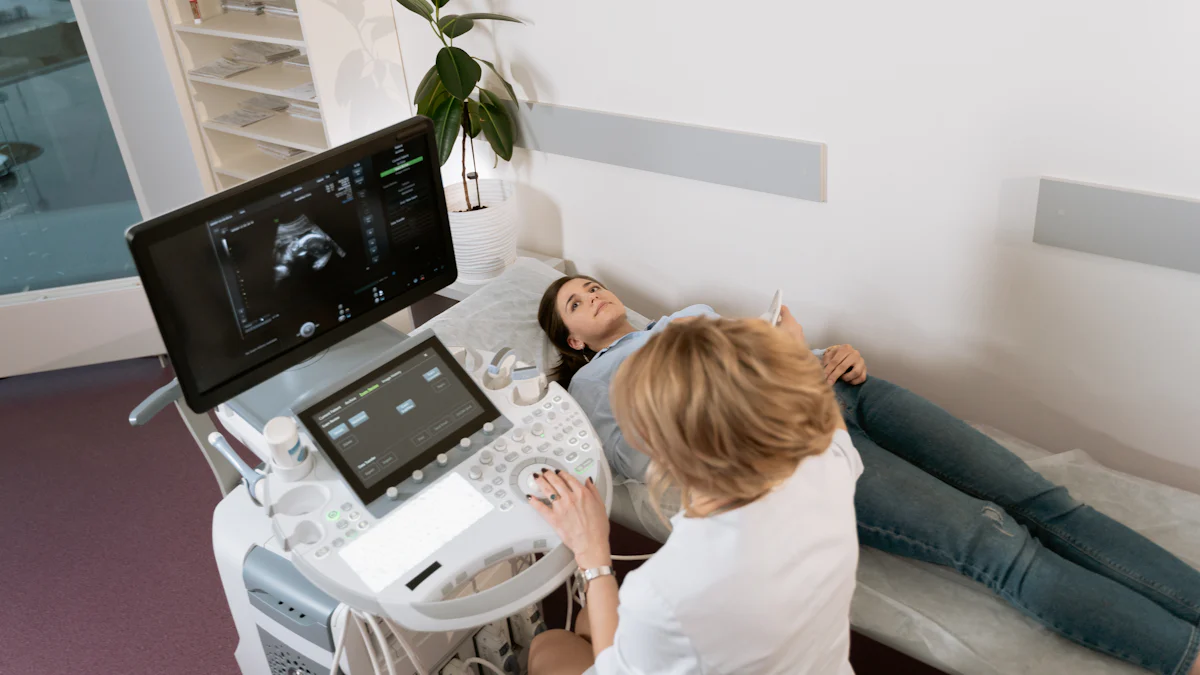
Helicobacter tests help detect the presence of Helicobacter pylori, a bacterium linked to stomach ulcers and other gastrointestinal issues. These tests, such as the urea breath test or stool antigen test, typically take 10 minutes to 1 hour. The H.Pylori Antigen Rapid Test Kit offers a convenient and efficient option for quick detection.
Key Takeaways
- Helicobacter tests, such as breath or stool tests, take 10 minutes to 1 hour.
- Preparing correctly is important; skip some medicines and fast if needed.
- The H. pylori Rapid Test Kit gives results in minutes, making it easy to use.
Types of Helicobacter Tests
Helicobacter pylori can be detected through several diagnostic methods. Each test offers unique advantages and is suited for specific clinical scenarios.
Urea Breath Test
The urea breath test is a non-invasive and highly accurate method for detecting H. pylori. During the procedure, the patient ingests a solution containing urea labeled with a special carbon isotope. If H. pylori is present, the bacteria break down the urea, releasing carbon dioxide that can be measured in the patient’s breath. This test typically takes about 15 to 20 minutes. It is often preferred due to its simplicity and reliability.
Tip: Patients should avoid eating or drinking for several hours before the test to ensure accurate results.
Stool Antigen Test
The stool antigen test identifies H. pylori by detecting its proteins in a stool sample. This test is non-invasive and suitable for both initial diagnosis and post-treatment monitoring. Patients collect a stool sample at home and submit it to a laboratory for analysis. The process of sample collection and submission is straightforward, and results are usually available within a few days.
Blood Test
A blood test detects antibodies produced by the immune system in response to H. pylori infection. While this method is quick and requires only a simple blood draw, it may not distinguish between a current and past infection. Healthcare providers often use this test as a preliminary screening tool.
Endoscopy with Biopsy
Endoscopy with biopsy is an invasive but comprehensive diagnostic method. A healthcare provider inserts a thin, flexible tube with a camera into the stomach to collect tissue samples. These samples are analyzed for the presence of H. pylori. This test is often reserved for patients with severe symptoms or when other methods yield inconclusive results. The procedure may take 30 to 60 minutes, depending on the complexity.
Note: Endoscopy requires sedation, and patients should arrange for someone to drive them home afterward.
Preparation for the Test
General Preparation Guidelines
Proper preparation ensures accurate results for Helicobacter tests. Patients should follow specific instructions provided by their healthcare provider. These general guidelines apply to most test types:
- Avoid certain medications: Antibiotics, proton pump inhibitors (PPIs), and bismuth-containing drugs can interfere with test results. Patients should stop these medications at least two weeks before testing, unless otherwise directed by their doctor.
- Fast when required: Some tests, like the urea breath test, require fasting for several hours before the procedure.
- Inform the healthcare provider: Patients should disclose any ongoing medications, supplements, or medical conditions that might affect the test.
- Stay hydrated: Drinking water is usually allowed unless explicitly restricted.
Tip: Always confirm preparation instructions with the healthcare provider to avoid errors.
Specific Preparations for Each Test Type
Each Helicobacter test has unique preparation requirements. Following these ensures the most reliable results:
- Urea Breath Test: Patients should fast for 6 to 8 hours before the test. They should also avoid smoking and chewing gum, as these can affect the results.
- Stool Antigen Test: Patients should collect the stool sample in a clean, dry container. They should avoid contamination with urine or water.
- Blood Test: Minimal preparation is needed. Patients should wear clothing that allows easy access to the arm for the blood draw.
- Endoscopy with Biopsy: Patients must fast for at least 8 hours before the procedure. They should arrange for transportation, as sedation is typically required.
Note: Following these steps ensures the accuracy of the test and minimizes the need for repeat procedures.
Results and Communication
How Long It Takes to Get Results
The time required to receive results from a Helicobacter test depends on the method used. Non-invasive tests, such as the urea breath test and stool antigen test, typically provide results within a few days. Laboratories analyze the samples and report findings to the healthcare provider. Blood tests, which detect antibodies, often yield results within 24 to 48 hours. Endoscopy with biopsy, being more complex, may take up to a week for results due to the detailed analysis of tissue samples.
For individuals seeking faster results, the H.Pylori Antigen Rapid Test Kit offers a convenient solution. This kit delivers accurate results in a shorter timeframe, making it an excellent choice for those requiring immediate answers. Its efficiency has made it a popular option for both patients and healthcare providers.
How Results Are Communicated to Patients
Healthcare providers play a crucial role in communicating test results. They typically share findings during a follow-up appointment or through secure communication channels, such as phone calls or patient portals. Providers explain the results in detail, ensuring patients understand their significance. For positive results, they discuss treatment options and next steps. Negative results are often accompanied by advice on maintaining gastrointestinal health.
Patients using the H.Pylori Antigen Rapid Test Kit can access results directly, depending on the kit’s design. This feature empowers individuals to take control of their health while maintaining privacy and convenience.
Tip: Patients should always consult their healthcare provider to interpret results and determine the appropriate course of action.
Follow-Up Actions After the Test
Steps to Take If the Test Is Positive
A positive Helicobacter test indicates the presence of H. pylori bacteria. Patients should follow their healthcare provider’s recommendations to address the infection effectively. The typical steps include:
- Start prescribed treatment promptly: Most cases require a combination of antibiotics and acid-reducing medications, known as triple or quadruple therapy. These medications eliminate the bacteria and reduce stomach acid to promote healing.
- Complete the full course of medication: Stopping treatment early can lead to antibiotic resistance or incomplete eradication of the bacteria.
- Monitor symptoms: Patients should track any changes in their gastrointestinal health during treatment. Persistent symptoms may require follow-up testing or adjustments to the treatment plan.
- Adopt lifestyle changes: Reducing stress, avoiding spicy foods, and limiting alcohol consumption can support recovery and prevent further irritation of the stomach lining.
Tip: Patients should inform their healthcare provider about any side effects from medications to ensure proper management.
Steps to Take If the Test Is Negative
A negative test result suggests the absence of H. pylori infection. However, patients experiencing gastrointestinal symptoms should not ignore them. Recommended actions include:
- Explore other causes: Healthcare providers may investigate alternative reasons for symptoms, such as acid reflux, food intolerances, or other gastrointestinal conditions.
- Maintain a healthy diet: Consuming a balanced diet rich in fiber, fruits, and vegetables supports overall digestive health.
- Schedule routine check-ups: Regular medical evaluations help monitor gastrointestinal health and address any emerging concerns.
- Avoid unnecessary medications: Overuse of antacids or acid reducers without medical advice can mask underlying issues.
Note: Patients should consult their healthcare provider for further evaluation if symptoms persist or worsen.
H.Pylori Antigen Rapid Test Kit
What It Is and How It Works
The H.Pylori Antigen Rapid Test Kit is a diagnostic tool designed for the quick and accurate detection of Helicobacter pylori. This kit uses advanced immunochromatographic technology to identify H. pylori antigens in stool samples. It provides a convenient alternative to traditional laboratory-based methods, making it suitable for both clinical and at-home use.
The testing process is straightforward. Patients collect a stool sample using the kit’s provided tools. The sample is then applied to the test device, which contains specialized antibodies that react with H. pylori antigens. Within minutes, the device displays results through visible lines, indicating whether the test is positive or negative. This rapid detection method eliminates the need for complex laboratory equipment, offering a user-friendly experience.
Benefits of Using This Test Kit
The H.Pylori Antigen Rapid Test Kit offers several advantages. Its speed and efficiency allow patients to obtain results in a matter of minutes, reducing the waiting time associated with traditional tests. The kit’s portability and ease of use make it accessible to individuals in remote areas or those unable to visit healthcare facilities.
This test kit also ensures high accuracy, providing reliable results for both initial diagnosis and post-treatment monitoring. Its non-invasive nature enhances patient comfort, as it eliminates the need for blood draws or endoscopic procedures. Additionally, the kit’s affordability makes it a cost-effective option for widespread use.
Healthcare providers and patients alike value the H.Pylori Antigen Rapid Test Kit for its ability to streamline the diagnostic process. By offering rapid and accurate results, it empowers individuals to take proactive steps in managing their gastrointestinal health.
Helicobacter tests offer quick diagnostic solutions, with most procedures completed in under an hour. Results typically arrive within a few days, depending on the test type. Follow-up actions, such as treatment or further evaluation, depend on the findings.
Note: Always consult a healthcare provider for tailored advice and appropriate next steps.
FAQ
How accurate are Helicobacter tests?
Helicobacter tests, such as the urea breath test and stool antigen test, offer high accuracy rates, often exceeding 90%. Accuracy depends on proper preparation and adherence to testing guidelines.
Can Helicobacter pylori infection resolve without treatment?
H. pylori infections rarely resolve without medical intervention. Untreated infections may lead to complications like ulcers or gastritis. Healthcare providers recommend prompt treatment to prevent long-term health issues.
Is the H.Pylori Antigen Rapid Test Kit suitable for children?
Yes, the H.Pylori Antigen Rapid Test Kit is suitable for children. Its non-invasive nature ensures comfort, making it an excellent diagnostic option for pediatric patients.
Tip: Always consult a healthcare provider before using any diagnostic test for children.
Post time: Jan-27-2025

